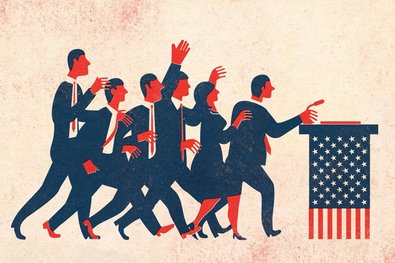
Are There Too Many G.O.P. Candidates?
Gov. John Kasich’s decision today to enter the 2016 presidential race brings the total number of prominent Republicans who have announced their candidacy to 16. Are there too many candidates for the G.O.P. nomination for president? Can such a large pool be good or bad for establishing a record?
* GOP = Grand Old Party = 1880년 이후 미국 공화당의 이명(異名)/ presidential race = 대통령 선거전/ prominent = 중요한; 유명한/ candidacy = 입후보, 출마/ nomination = 지명, 추천, 임명
 대통령 후보를 위한 공화당의 입후보자가 너무 많은가요?
대통령 후보를 위한 공화당의 입후보자가 너무 많은가요?
1. A Reflection of Our Current Politics
The quantity of candidates running for president won't matter so much as the quality of leadership and vision that emerges by the end of the process.
2. It’s About the Money, Not the Substance
Post-Citizens United, all that candidates really need to have fairly substantial – even surprising – staying power is a small group of megadonors who will 'feed the meter.'
3. A Line-up of Generic Conservative Candidates
In previous cycles, lines of ideological debate were clear. This time, the similarities among the candidates are more striking than their differences.
4. More Candidates, Not Fewer
Lots of candidates is a way of telling the elites and news media that competition is good and the establishment choice doesn't always have to win.
5. No Matter How Many, All Should Be Heard
There could be two back-to-back nights of debates with the names of all Republican candidates put in a hat numbered one to 16.
6. This Is the New Normal
With 16 Republican politicians on the public stage expect either democracy at its purest or anarchy at its most bewildering.
Sample Essay
If Someone Has the Money, Why Not Run for President?
A presidential campaign – even if it's a longshot – is a singular calling. One motivation for running despite slim chances might be to draw attention to certain issues or perspectives that would otherwise be ignored.
But what it says about the money is: it’s not theirs! These candidates are like startups, looking for venture capital – especially given that, with superPACs and outside groups, all it takes is one committed billionaire to substantially fund a campaign. Longshot candidates may risk their time, but not, in most cases, their personal fortunes – except for Donald Trump, who has plenty of money (just ask him), but craves credibility and respect.
Candidates who muster a decent showing in a campaign can often capitalize on that to gin up enthusiasm and funding for a future run for office, or role on television as a commentator, or even a lucrative book contract. And the "election industrial complex" will encourage their dreams, even if most feel they're better described as "pipe dreams."
Post-Citizens United, all that candidates really need to have fairly substantial – even surprising – staying power is a small group of megadonors who will "feed the meter." Donors can fund the single-candidate superPAC (or multiple superPACs – Sen. Ted Cruz has eight, so far) that very often fuels the ad war. Now, we’re seeing these outside groups taking charge of what used to be core functions of candidates’ campaigns.
If campaigns were really about substance and merit and a true democratic process, money would not be the thing that the candidates focus on. But the current system demands that emphasis.
Sure, there have been longshot campaigns that eschewed deep pockets (Ben Carson and Sen. Bernie Sanders have received more than three-fourths of their millions in small donations). But in this day and age, nobody gets elected president without a lot of money. The big question is how many I.O.U.s it represents.





![]() 대통령 후보를 위한 공화당의 입후보자가 너무 많은가요?
대통령 후보를 위한 공화당의 입후보자가 너무 많은가요?






